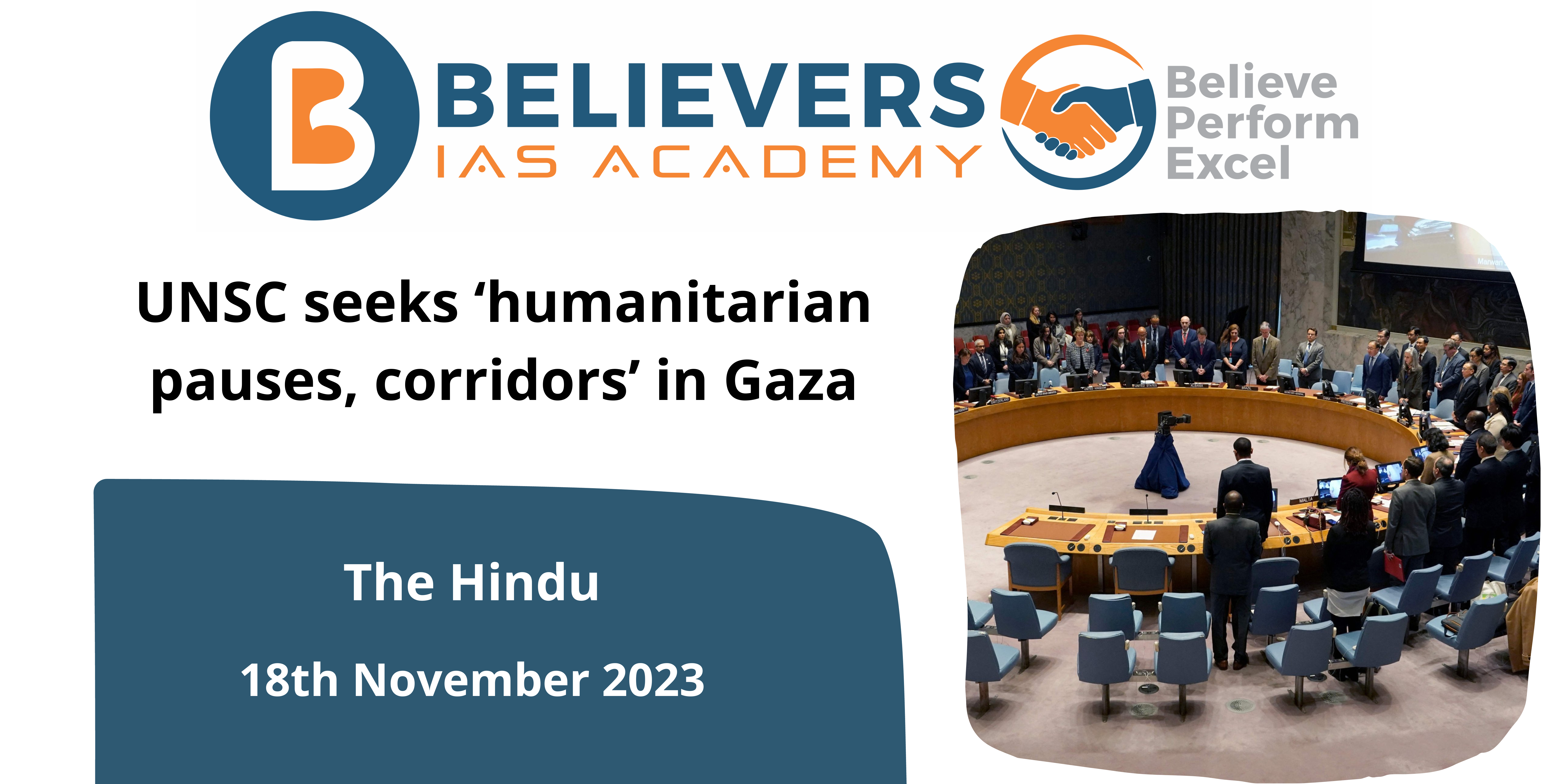UNSC seeks ‘humanitarian pauses, corridors’ in Gaza
Context
The United Nations Security Council has called for “extended humanitarian pauses” in the Gaza Strip, breaking its silence for the first time since the latest round of the brutal confrontation between Israel and Hamas began last month. However, Israel stated that such a “pause” would not be possible until Hamas’ hostages were released.
Summary of the conflict
- Israel and the Palestinian militant group Hamas are at war in the Israel-Hamas war. The war began on October 7, 2023, when Hamas militants attacked southern Israel from the Gaza Strip. The attack murdered over 1,200 individuals, the majority of whom were civilians, and seized over 200 hostages.
- Israel retaliated with airstrikes and a Gaza siege. Israel has also ordered the evacuation of Palestinians from northern Gaza.
- The battle has aggravated Gaza’s humanitarian predicament. According to the World Health Organization, more than 1.6 million people have been displaced, and 22 of Gaza’s 36 hospitals remain closed. Laboratories in Israel and the West Bank remain idle, and most academic work has ceased or stalled.
UN Security Council’s Involvement:
- The United Nations Security Council has broken its silence on the violence in Gaza between Israel and Hamas.
- The Security Council has addressed the subject for the first time since the latest wave of fighting began.
Resolution Passed on Humanitarian Pause & Humanitarian Corridors:
- A humanitarian pause, as defined by the UN, is a brief stoppage of hostilities for humanitarian reasons. It is usually limited to a given area and time frame.
- The resolution demands an adequate number of days of humanitarian pauses and corridors.
- The UN, Red Cross, and other assistance organizations would be able to supply water, electricity, gasoline, food, and medical supplies as a result of this.
- The resolution also demands the immediate and unconditional release of all hostages held by Hamas and other terrorist organizations, including children.
- Malta prepared the resolution. The vote was 12-0, with the US, UK, and Russia abstaining.
- During an armed conflict, humanitarian corridors are temporary demilitarized zones that allow for safe passage in a given area. They are formed as a result of agreements reached between the parties involved in the conflict.
International Humanitarian Obligations:
- All parties are urged to uphold international humanitarian commitments, particularly those relating to the protection of civilians, particularly children.
- The resolution demands the immediate and unconditional release of all 230 hostages held by Hamas.
- While the resolution condemns the attacks and calls for the release of hostages, it does not condemn the October 7 attack by Hamas militants.
Stand of Israel on the issue:
- Israel has pointed out that humanitarian pauses and corridors won’t be possible unless Hamas release the hostages which is unlikely.
- Even though the Security Council’s declarations are legally binding, there were instances when countries didn’t accept the resolutions passed.
Way forward:
- Immediate Humanitarian Intervention: Prioritize immediate and unrestricted humanitarian access to the Gaza Strip to give life-saving aid and medical care to the impacted civilian population.
- Negotiations for Hostage Release: Engage in diplomatic efforts to negotiate the release of Hamas hostages, with the participation of international parties and mediators if needed.
- Diplomatic Initiatives Relaunched: Encourage increased diplomatic efforts to bring all parties to the table for negotiations. Facilitate talks between Israel and Hamas to secure a comprehensive cease-fire deal.
- International Conflict Resolution: Seek the participation of international mediators or organizations, such as the United Nations or regional bodies, to mediate talks and assist in the development of a long-term solution.
- Resolutions that are both clear and balanced: Work toward Security Council resolutions condemning violence and attacks from all parties involved to provide a balanced approach to the crisis.
- Identify and Address the Root Causes: Through diplomatic and long-term solutions, address the underlying reasons that are fueling the conflict, such as political grievances, economic imbalances, and historical tensions.
- Participation of Regional Players: Engage regional actors and stakeholders to secure support for diplomatic initiatives and regional stability.
Monitoring of Human Rights: Establish systems for monitoring and reporting human rights violations by all parties involved, and hold those responsible for violations accountable.




